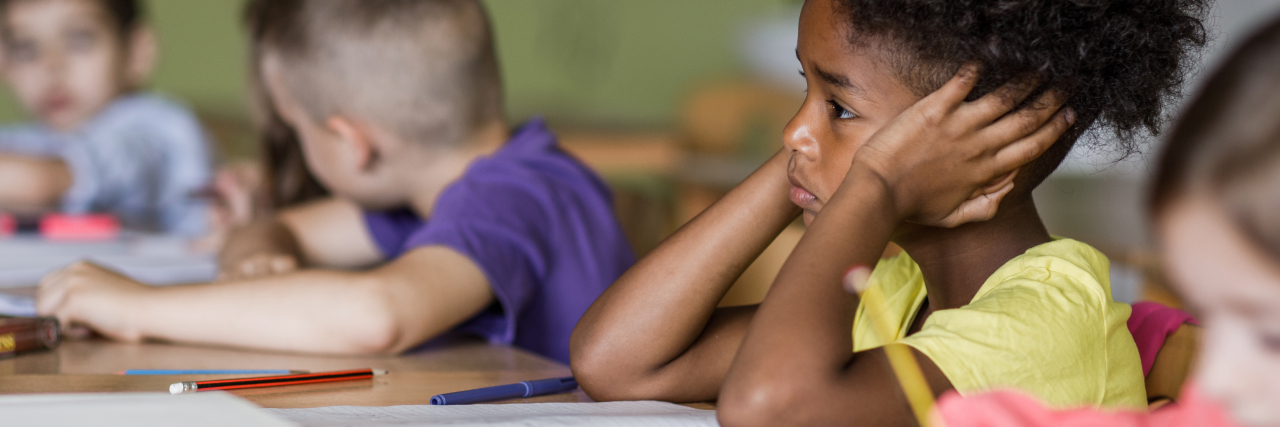Neurodiverse Students Shouldn't Be Forced to Betray Their Authentic Selves to 'Fit In'
Until our education system commits to implementing universal trauma-informed social-emotional learning programming for all students, we will continue to traumatize our most vulnerable youth by relying on ableist and culturally insensitive curriculum and practices.
In schools across the United States, millions of students receive Special Education Services through Individualized Education Programs, which contain goals in areas of academic support, communication, behavior, executive functioning, and social-emotional learning (SEL). SEL goals are typically focused on gaining awareness of emotions, increasing self-advocacy skills, or improving social skills. Students whose SEL goals are related to social skills are typically students who are neurodivergent, experience mental health concerns, or are frequently disciplined for failing to follow behavioral norms. These students are viewed as deficient in areas of socialization compared to their neurotypical peers, who are considered to be proficient models of the ideal to which all students should aspire.
This flawed ideology is ableist, culturally insensitive, rooted in white supremacist values, and is being perpetuated at all levels of our education system. This leads to the pervasive false belief that teaching neurodivergent individuals to conform to a specific set of social norms is the only way for them to avoid rejection, marginalization, isolation, loneliness, and depression. It places all of the responsibility on neurodivergent individuals, and completely disregards the importance of community members working together to create a more inclusive and accessible society for all.
Unfortunately, this flawed ideology serves as the premise for scripted social skills curricula, which are typically taught to neurodiverse students in small group settings on a regular basis, often in isolated environments, by school-based mental health professionals. Most of the curricula focus on explicit instruction of strategies that neurodivergent students can utilize to fit in with peer groups and understand the implicit messaging behind nonverbal communication. These skills require conformity to a rigid set of social norms that encourage neurodiverse students to mask, camouflage, and betray their authentic selves in order to gain social approval from their peers. Our continued reliance on these curricula and practices is traumatizing our neurodiverse youth.
Furthermore, we are under-serving our neurotypical youth by failing to offer them explicit instruction in social skills and similar topics, such as empathy, respect, inclusion, and celebration of all types of diversity. In addition, the regular practice of burdening neurodivergent students with full responsibility related to socialization, while simultaneously ignoring both the social needs and responsibilities of their neurotypical peers, is incredibly ableist and needs to be eradicated. Instead, we should focus on explicit instruction for all students on the importance of creating welcoming, inclusive, and accessible environments for all students, regardless of ability or disability.
A better use of time and resources would create structured settings where all students can engage in organic social interactions with empathetic peers, under the supervision of staff. This would allow all students to make new friends, have fun, and gain a sense of accomplishment and proficiency in both socialization and inclusiveness through practice. In addition, most students would be better served by participating in group activities that focus on engaging in mutually-enjoyable activities with peers, or working together to accomplish a common goal. Examples include:
- Board or video games
- Visual or performing arts
- Outdoor recreation and sustainability
- Non-competitive movement-based activities
- Volunteerism
- Leadership and self-advocacy
- Celebrating diversity and promoting inclusion
- Social-emotional learning and mental wellness
- Restorative justice and other models of peer mediation
- Other activities that promote empathy and inclusion
If schools want to implement social skills curriculums in an inclusive and neurodiversity-affirming way, they must implement universal or school-wide interventions for all students, not just students who receive Special Education services. These universal interventions should focus on understanding, accepting, and celebrating diversity of all kinds, as well as teaching students how to create a welcoming and empathetic school culture. If we teach our youth to value and celebrate diversity of all kids, we can build a more inclusive and accessible society for all.
Getty image by Skymesher.

